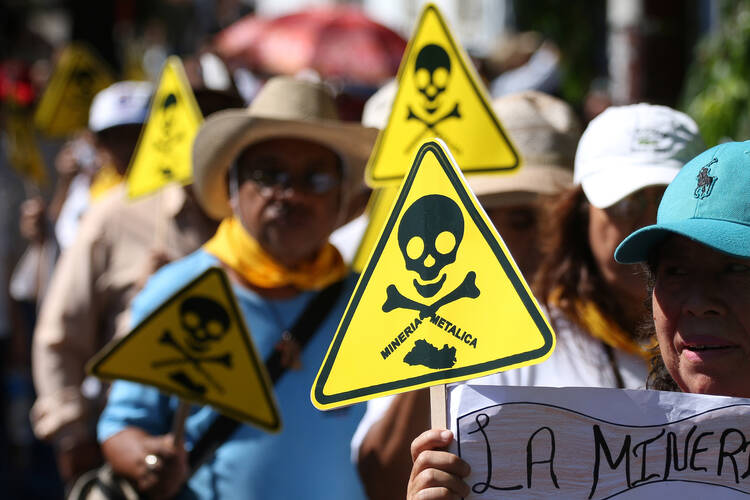Canadian mining companies with operations abroad need to be more heavily regulated at home, says a recent letter from the Canadian Conference of Catholic Bishops (C.C.C.B.) addressed to Prime Minister Justin Trudeau. “We, as Canadians, are among the privileged,” the letter says. “We cannot remain indifferent to the cry of the poor or to the repercussions of environmental degradation on our common home. We cannot accept the unethical way Canadian mining companies have been operating in Latin America or other regions of the world, taking the absence of effective regulatory schemes as a reason to shirk their ethical responsibilities.”
Written by Most Rev. Douglas Crosby, O.M.I., the bishop of Hamilton and president of the C.C.C.B., the letter was also sent to Canadian officials Chrystia Freeland, the minister of foreign affairs; James Gordon Carr, the minister of natural resources; and Carolyn Bennett, the minister of indigenous and Northern affairs.
“It is well known that the control, extraction, processing and trade of these resources finance armed groups whose exploitation of power hinders and endangers vulnerable populations,” says the letter. “We have heard stories of how threats, violence, extortion and even murder have been used to advance the progress of big business and industry to the detriment—both human and economic—of the poor.”
Talking about the motivation for the letter, Bishop Crosby told America that the exploitation of land, indigenous peoples and poor communities carried out by Canadian mining companies “has been on the radar for a few years, and this is just raising the issue one more time.”
“We have heard stories of how threats, violence, extortion and even murder have been used to advance the progress of big business and industry."
In 2013, Development and Peace, the official development organization of the Catholic Church in Canada, launched A Voice For Justice, a campaign to educate Canadians about “mine-affected communities in Africa, Asia and Latin America that are experiencing conflict, pollution, forced displacements and other negative impacts from the presence of Canadian [-owned] mines.” The letter also mentions previous attempts on the part of the C.C.C.B. and other organizations to address the destructive actions of Canadian mining companies.
Bishop Crosby said the C.C.C.B. was especially moved to take on the Canadian mining industry by an encounter with Latin American bishops organized by Development and Peace. “We ourselves were educated as to the seriousness of the problem, and [the Latin American bishops] showed pictures of their situation and their particular communities that have been so seriously affected by these mining practices,” he said. “I think most of the [Canadian] Conference was taken aback actually by what we saw.”
The letter on mining, Bishop Crosby stated, is part of “an ongoing conversation between the Conference and government. Many mining companies are Canadian, and other bishops have asked us to get involved. This is a way of assisting foreign protests of those companies here in Canada.”
It is also the latest in a series of letters by Canadian bishops aiming to speak out in the public arena. For example, Bishop Crosby sent a letter on behalf of the C.C.C.B. on June 29, addressed to Ms. Freeland, expressing “profound concern” over the foreign affairs minister’s suggestion in a speech made to the House of Commons that abortion was a core value of Canada’s foreign policy.
According to a Development and Peace report on a 2013 hearing before the Inter-American Commission on Human Rights of the Organization of American States, “more than 75 percent of the world’s extractive companies are registered [in Canada] and more than 60 percent of their mining projects are in Latin America.”
Connecting environmental and indigenous issues in particular, the letter reflects what Pope Francis writes in his 2015 encyclical “Laudato Si’,” which says indigenous people are pressured by mining projects to move from the land that they are uniquely gifted to take care of. “‘Laudato Si’ is part of the motivation,” said Bishop Crosby. “Our concern about mining practices preceded, predated ‘Laudato Si’,’ but it really gives more impetus to us in terms of responding to these issues and taking an interest in them.”
Several regulatory actions are recommended to the Canadian government in the letter, repeating earlier suggestions from an open letter signed by a coalition of Latin American and international organizations sent to Mr. Trudeau last April. The open letter has not received a reply. “I know the prime minister gets our letters, but I don’t know what the mining lobby is like,” said Bishop Crosby.
In the meantime, Bishop Crosby praised the attempt by Development and Peace to keep the injustices of Canadian mining companies in the public eye, and he is encouraged by what he called the “grassroots” nature of the organization. “It’s what makes it, I think, effective,” he said. “There are always people in parishes who have a social justice bent and want to be involved and engaged in these things. Through Development and Peace, they can be. This is an active part of the Catholic Community in Canada.”










